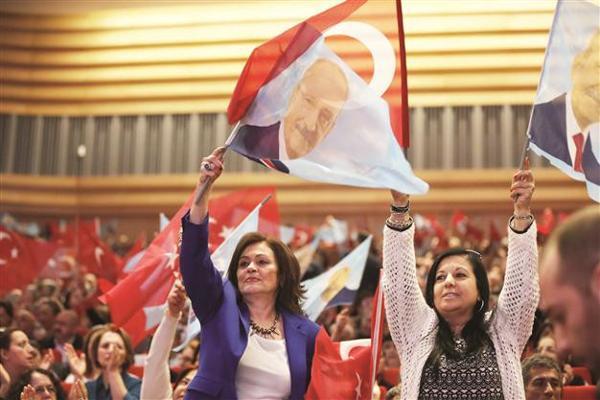CHP promises to be the party of the poor
Serkan Demirtaş


AA Photo
Kemal Kılıçdaroğlu, leader of the Republican People’s Party (CHP), had already voiced his election target as 35 percent of the votes, nearly 10 points more than the party received in the 2011 polls, meaning he has to find an additional 6 to 7 million of votes to achieve his goal.With this objective in mind, Kılıçdaroğlu and his team have developed a precise strategy to reach out to new social classes, mainly composed of lower income groups in society.
The problem the CHP faces, however, is the fact that a considerably large portion of these classes are voting for the ruling Justice and Development Party (AKP), for two main reasons. First, they have been provided with social aid for years from both the government and AKP-run municipalities, creating a sort of dependence on the ruling party. The second aspect, however, is more complicated and more sociological, as these low-income, less-educated groups are always closer to conservative and even religious politicians.
Thus, as the party of the urbanized, well-educated and higher income groups, the CHP is now trying to break this circle and to become the party of the poor and needy. Concrete promises announced by Kılıçdaroğlu on April 19 such as increasing the minimum wage to 1,500 Turkish Liras, erasing credit card debts, pledging extra wages to the retired and more are seen as important messages delivered to these groups. Given that a large part of the 11 million retired people in Turkey are living on less than 1,000 liras per month and that there are masses suffering from poverty, Kılıçdaroğlu’s strategy to deal with these specific problems through very simple language and concrete measures seems to be important.
Along with this strategy to reach out to new groups of voters, the CHP leader is also promising to make a new beginning for Turkey - avoiding the use of the term “new Turkey” - by drawing a profile of a country highly respected in the international community with its level of democracy, human rights and freedoms, as well as its economic standing.
The CHP’s manifesto calls this the “Great Objectives of Transformation for a Promising Future.” It is in fact a summary of the steps the party will take to correct the image of Turkey broken at the hands of the AKP.
The separation of powers and the rule of law are two main themes of the manifesto, which reads, “The priority of the CHP is to re-establish the rule of law and fundamental freedoms and to build ‘The Republic of Freedoms’ by ending [the climate of] fear.”
The CHP envisages the politics of rights and freedoms not as symbolic legal status, but as a political opportunity to describe citizens as power for democratic transformation, the manifesto suggests, adding this is non-discriminatory and embracing of all citizens regardless of their ethnicity, religion, class or gender.
